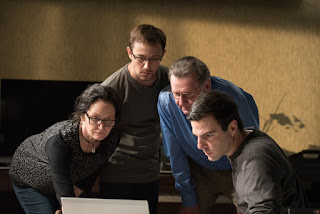Snowden
How dare Oliver Stone make a film that calls into question the integrity of the most important institution in human history, an organization without which the world would surely be lying in ruins by now? I am referring, of course, to that bulwark of democracy and all things good, that most treasured of human institutions (at least by ME): the Central Intelligence Agency. How dare he???
Retroactive sarcasm alert for those who are not regular readers.
Of course, this is not the first time Stone has made a film that exposes the nefarious activities of that most evil of human institutions (along with its brother, the NSA, which also gets bad press in Snowden), most recently in his twelve-part documentary, The Untold History of the United States. Stone couldn’t find a single Hollywood studio to finance Snowden and ended up being financed from Germany, where he also filmed Snowden to avoid interference from the NSA and CIA.
Joseph Gordon-Levitt stars as Edward Snowden, the whistleblower who, in June of 2013, gave up a promising career in intelligence to expose the way the CIA and NSA were using the internet to spy on literally everybody on the planet, including Americans and world leaders like Germany’s Angela Merkel (who was not at all amused). And not just spy on people, but, after spying on them, blow them up with drones without a second’s pause.
Having watched and loved the great documentary, Citizenfour, in 2014, which films Snowden immediately before, during, and after his triumphant exposé in the global media (and which features as a framing device for Stone’s Snowden), I didn’t understand why Stone needed to make a dramatized version of the story. The mediocre reviews from critics also didn’t provide me with any encouragement to watch Stone’s film. But I’m very glad I ignored those deterrents and watched Snowden anyway, because it’s a marvellous and vital film, especially relevant at this time, as we come to the end of one of the most depressing American election seasons in history (the Sanders story notwithstanding).
It didn’t take me long to appreciate why Stone made the film. Watching Snowden live in Citizenfour was astonishing and mesmerizing, but that documentary did relatively little to provide a context for Snowden’s actions, at least compared to Snowden. Only in this film do we see the influence of his partner, Lindsay Mills (Shailene Woodley), in his life and his politics, and understand his growing concern for the way the CIA and NSA spy on people and lie about what they are doing.
Along the way, we meet Corbin O’Brian (Rhys Ifans), the CIA recruiter who hires and mentors Snowden despite Snowden’s lack of formal education. The scene in which O’Brian confronts Snowden about lying on one of his regular exams/interrogations is beautifully done, revealing how the CIA and Orwell’s Big Brother are one and the same. And then there’s a delicious cameo by Nicolas Cage as a CIA computer expert who briefly befriends Snowden. Other actors of note include Melissa Leo (as filmmaker Laura Poitras), Zachary Quinto (as Guardian journalist Glenn Greenwald) and Tom Wilkinson (as Guardian journalist Ewen MacAskill), the three people who joined Snowden in a Hong Kong hotel room and made his exposé possible. All of the acting in Snowden is solid if not extraordinary (Ifans stood out for me).
The score and cinematography are likewise solid and the style of the film worked well for me, providing just enough creative elements to keep it from being too straightforward a true-story film. Unlike Sully, in which I felt no suspense because, as in Snowden, I knew the outcome of the story, I did feel the suspense in Snowden. And I loved the way Stone ended the film.
As for the accusation by many film critics that Snowden is too one-sided, not presenting the dangers (security breaches) produced by whistleblowers like Snowden and making him too much of a hero, I can only offer my opinion that, whatever Snowden’s faults, his bravery as a whistleblower makes him one of the great American heroes of our time. There is no ‘other side’ that questions whether Snowden is a traitor deserving of capital punishment. All of us who know hidden inside information about organizations need to ask when it is appropriate, and in the best interests of all, to be a whistleblower, but in the case of the CIA and NSA, it’s a no-brainer (and I hope Snowden inspires an entire generation of whistleblowers). Indeed, my only major complaint about Snowden is that it might not have been bold enough in its condemnation of American intelligence agencies.
While Citizenfour is a better film than Snowden, I am also giving Snowden **** (and a likely spot in my top ten films of 2016). My mug is up.


Comments
Post a Comment